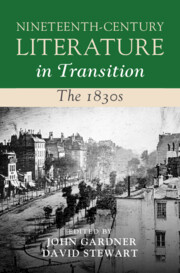Book contents
- Nineteenth-Century Literature in Transition: The 1830s
- Nineteenth-Century Literature in Transition
- Nineteenth-Century Literature in Transition: The 1830s
- Copyright page
- Contents
- Figures
- Contributors
- Acknowledgements
- Introduction
- Chapter 1 On the Eve
- Chapter 2 ‘An Infectious Madness’
- Chapter 3 Augustus Hardin Beaumont, Slavery Apologias, and Popular Radical Literature in the 1830s
- Chapter 4 Patterns of Industry
- Chapter 5 Mother Earth
- Chapter 6 The Polite Fictions of Slavery
- Chapter 7 Suffering, Sentiment, and the Rise of Humanitarian Literature in the 1830s
- Chapter 8 Steam and Iron in the 1830s
- Chapter 9 Lithography and the Comic Image 1825–1840
- Chapter 10 Jorrocks’s Canon
- Chapter 11 Tennyson, Dickens, Poe, Browning, and the Brontës:Blackwood’s Magazine and ‘The Foreheads of a New Generation’
- Chapter 12 Boz in London: The 1830s and the Urban Turn in the English Novel
- Chapter 13 Letitia Elizabeth Landon, Chronicler of the 1830s
- Chapter 14 Railway Imaginary in the 1830s
- Chapter 15 The Emerging Language of Photography
- Afterword
- Index
Chapter 5 - Mother Earth
Gender and Geology in the 1830s
Published online by Cambridge University Press: 30 May 2024
- Nineteenth-Century Literature in Transition: The 1830s
- Nineteenth-Century Literature in Transition
- Nineteenth-Century Literature in Transition: The 1830s
- Copyright page
- Contents
- Figures
- Contributors
- Acknowledgements
- Introduction
- Chapter 1 On the Eve
- Chapter 2 ‘An Infectious Madness’
- Chapter 3 Augustus Hardin Beaumont, Slavery Apologias, and Popular Radical Literature in the 1830s
- Chapter 4 Patterns of Industry
- Chapter 5 Mother Earth
- Chapter 6 The Polite Fictions of Slavery
- Chapter 7 Suffering, Sentiment, and the Rise of Humanitarian Literature in the 1830s
- Chapter 8 Steam and Iron in the 1830s
- Chapter 9 Lithography and the Comic Image 1825–1840
- Chapter 10 Jorrocks’s Canon
- Chapter 11 Tennyson, Dickens, Poe, Browning, and the Brontës:Blackwood’s Magazine and ‘The Foreheads of a New Generation’
- Chapter 12 Boz in London: The 1830s and the Urban Turn in the English Novel
- Chapter 13 Letitia Elizabeth Landon, Chronicler of the 1830s
- Chapter 14 Railway Imaginary in the 1830s
- Chapter 15 The Emerging Language of Photography
- Afterword
- Index
Summary
The 1830s was a golden age for geology in Britain, in which at least three decades of commitment to patient observation, inductive reasoning, and fieldwork had led to a newfound public confidence for the science. Historians have long argued that a cult of masculinity emerged in response to this climate: physically and intellectually robust, the ‘gentleman geologist’ alone could be trusted to make reliable observations of the Earth without lapsing into theological or evolutionary speculation. Focussing on the work of three women geologists – Maria Graham, Charlotte Murchison, and Maria Hack – this chapter argues against this male history of geology. Paying attention to the deeply intertwined labours of male and female geologists in this period reveals that gender was a tool in a serious debate about the role of the body – of the emotions and the senses – in scientific observation. Was it possible, geologists asked, to apprehend the natural world entirely unencumbered by emotion, attachment, or the vagaries of the senses? What kinds of bodies could encounter the Earth in its most extreme guises and still achieve the right philosophical perspective and detachment?
- Type
- Chapter
- Information
- Nineteenth-Century Literature in Transition: The 1830s , pp. 105 - 126Publisher: Cambridge University PressPrint publication year: 2024



